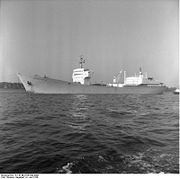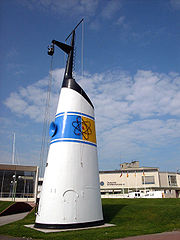.gif)
Otto Hahn (ship)
Encyclopedia


Howaldtswerke
Howaldtswerke-Deutsche Werft is a German shipbuilding company, headquartered in Kiel. In 2009 it was the largest shipyard in Germany and has more than 2,400 employees. It has been part of ThyssenKrupp Marine Systems owned by ThyssenKrupp, since 2005...
Deutsche Werft AG of Kiel
Kiel
Kiel is the capital and most populous city in the northern German state of Schleswig-Holstein, with a population of 238,049 .Kiel is approximately north of Hamburg. Due to its geographic location in the north of Germany, the southeast of the Jutland peninsula, and the southwestern shore of the...
. She was launched
Ship naming and launching
The ceremonies involved in naming and launching naval ships are based in traditions thousands of years old.-Methods of launch:There are three principal methods of conveying a new ship from building site to water, only two of which are called "launching." The oldest, most familiar, and most widely...
in 1964 and named in honour of Otto Hahn
Otto Hahn
Otto Hahn FRS was a German chemist and Nobel laureate, a pioneer in the fields of radioactivity and radiochemistry. He is regarded as "the father of nuclear chemistry". Hahn was a courageous opposer of Jewish persecution by the Nazis and after World War II he became a passionate campaigner...
, the German chemist and Nobel prize
Nobel Prize
The Nobel Prizes are annual international awards bestowed by Scandinavian committees in recognition of cultural and scientific advances. The will of the Swedish chemist Alfred Nobel, the inventor of dynamite, established the prizes in 1895...
winner, who was credited with the discovery of nuclear fission of uranium in 1938. The first captain of the Otto Hahn was Heinrich Lehmann-Willenbrock, a famous German U-Boat ace of World War II.
In 1968, the ship's 38-megawatt nuclear reactor
Nuclear reactor
A nuclear reactor is a device to initiate and control a sustained nuclear chain reaction. Most commonly they are used for generating electricity and for the propulsion of ships. Usually heat from nuclear fission is passed to a working fluid , which runs through turbines that power either ship's...
was taken critical and sea trial
Sea trial
A sea trial is the testing phase of a watercraft . It is also referred to as a "shakedown cruise" by many naval personnel. It is usually the last phase of construction and takes place on open water, and can last from a few hours to many days.Sea trials are conducted to measure a vessel’s...
s began. In October of that year, NS Otto Hahn was certified for commercial freight transport and research.
Configured to carry passengers and ore, Otto Hahn made her first port call in Safi, Morocco
Safi, Morocco
Safi is a city in western Morocco on the Atlantic Ocean. The capital of the Doukkala-Abda Region, it has a population of 282,227 , but is also the centre of an agglomeration which has an estimated 793,000 inhabitants ....
, loading a cargo of phosphate
Phosphate
A phosphate, an inorganic chemical, is a salt of phosphoric acid. In organic chemistry, a phosphate, or organophosphate, is an ester of phosphoric acid. Organic phosphates are important in biochemistry and biogeochemistry or ecology. Inorganic phosphates are mined to obtain phosphorus for use in...
ores, in 1970. In 1972, after four years of operation, her reactor was refueled. She had covered some 250,000 nautical miles (463,000 km) on 22 kilograms of uranium
Uranium
Uranium is a silvery-white metallic chemical element in the actinide series of the periodic table, with atomic number 92. It is assigned the chemical symbol U. A uranium atom has 92 protons and 92 electrons, of which 6 are valence electrons...
.
In 1979 Otto Hahn was deactivated. Her nuclear reactor and propulsion plant were removed and replaced by a conventional diesel engineroom. In nine years, she had traveled 650,000 nautical miles (1,200,000 km) on nuclear power, visiting 33 ports in 22 countries.
In 1983, Otto Hahn was recommissioned as the container ship Trophy and leased into commercial service. On 19 November of that year, she was renamed Norasia Susan. She became the Norasia Helga in 1985, Hua Kang He in 1989, Anais in 1998, Tal in 1999 and finally Madre in the same year. Her last owner, from 2006, was the Liberian-based Domine Maritime Corporation, under the management of Alon Maritime Corporation of Athens, Greece. The ship was scrapped at Alang, India in 2009.
Her funnel is preserved at the Deutsches Schiffahrtsmuseum
Deutsches Schiffahrtsmuseum
The Deutsches Schiffahrtsmuseum is a museum in Bremerhaven, Germany. It is part of the Gottfried Wilhelm Leibniz Scientific Community. The main museum building was opened on 5 September 1975 by then-president Walter Scheel, though scientific work already had started in 1971...
(German Maritime Museum) in Bremerhaven
Bremerhaven
Bremerhaven is a city at the seaport of the free city-state of Bremen, a state of the Federal Republic of Germany. It forms an enclave in the state of Lower Saxony and is located at the mouth of the River Weser on its eastern bank, opposite the town of Nordenham...
.
General characteristics
- Displacement 25,790 tons (26,200 t) full, 16,871 tons (17,141 t) standard
- Length: 164.3 m waterline, 172.0 m overall
- Beam: 23.4 m
- Freeboard: 5.3 m
- Capacity: (39,760 m³)
- Propulsion: Nuclear drive
- Speed: 15.75 knots (29 km/h)
- Waterproof compartments: 14
- Loading spaces: 6
- Complement 63 crew, 35 research personnel maximum
- Reactor
- Power: 38 MW
- Volume: 35 m³
- Pressure: 85 kpKilogram-forceA kilogram-force , or kilopond , is a gravitational metric unit of force. It is equal to the magnitude of the force exerted by one kilogram of mass in a gravitational field...
/cm² (8.3 MPa) - Temperature: 300 °C
- Fuel: 1.7 metric tons of 3.5-6.6% enriched uraniumEnriched uraniumEnriched uranium is a kind of uranium in which the percent composition of uranium-235 has been increased through the process of isotope separation. Natural uranium is 99.284% 238U isotope, with 235U only constituting about 0.711% of its weight...
- Endurance under full load: 900 days
- Average fuel burn-up: 23,000 MW·d/t
- Average thermal neutron flux: 1.1×1013/(cm²·s)
- Number of elements/fuel rods: 12/2810
- Equivalent minor diameter: 1050 mm
- Active core height: 830 mm
- Fuel rod diameter: 11.4 mm
- Fuel cladding: 0.8 mm of ZircaloyZircaloyZirconium alloys are solid solutions of zirconium or other metals, a common subgroup having the trade mark Zircaloy. Zirconium has very low absorption cross-section of thermal neutrons, high hardness, ductility and corrosion resistance...
-4 - Manufacturer: Deutsche Babcock & Wilcox-Dampfkesselwerke AGDeutsche BabcockDeutsche Babcock AG was a German manufacturing company based in Oberhausen in the Ruhr District, the center of the German economy. The company was established in 1898 as a German subsidiary of the British boilermaking company Babcock and Wilcox, Limited...
und Internationale Atomreaktorbau GmbH
See also
- List of civilian nuclear ships
- Nuclear marine propulsionNuclear marine propulsionNuclear marine propulsion is propulsion of a ship by a nuclear reactor. Naval nuclear propulsion is propulsion that specifically refers to naval warships...
- List of ship launches in 1964
Further reading
- Hajo Neumann: Vom Forschungsreaktor zum 'Atomschiff' OTTO HAHN: Die Entwicklung von Kernenergieantrieben für die Handelsmarine in Deutschland. Hauschild Verlag, Bremen 2009, ISBN 978-3-89757-446-5

